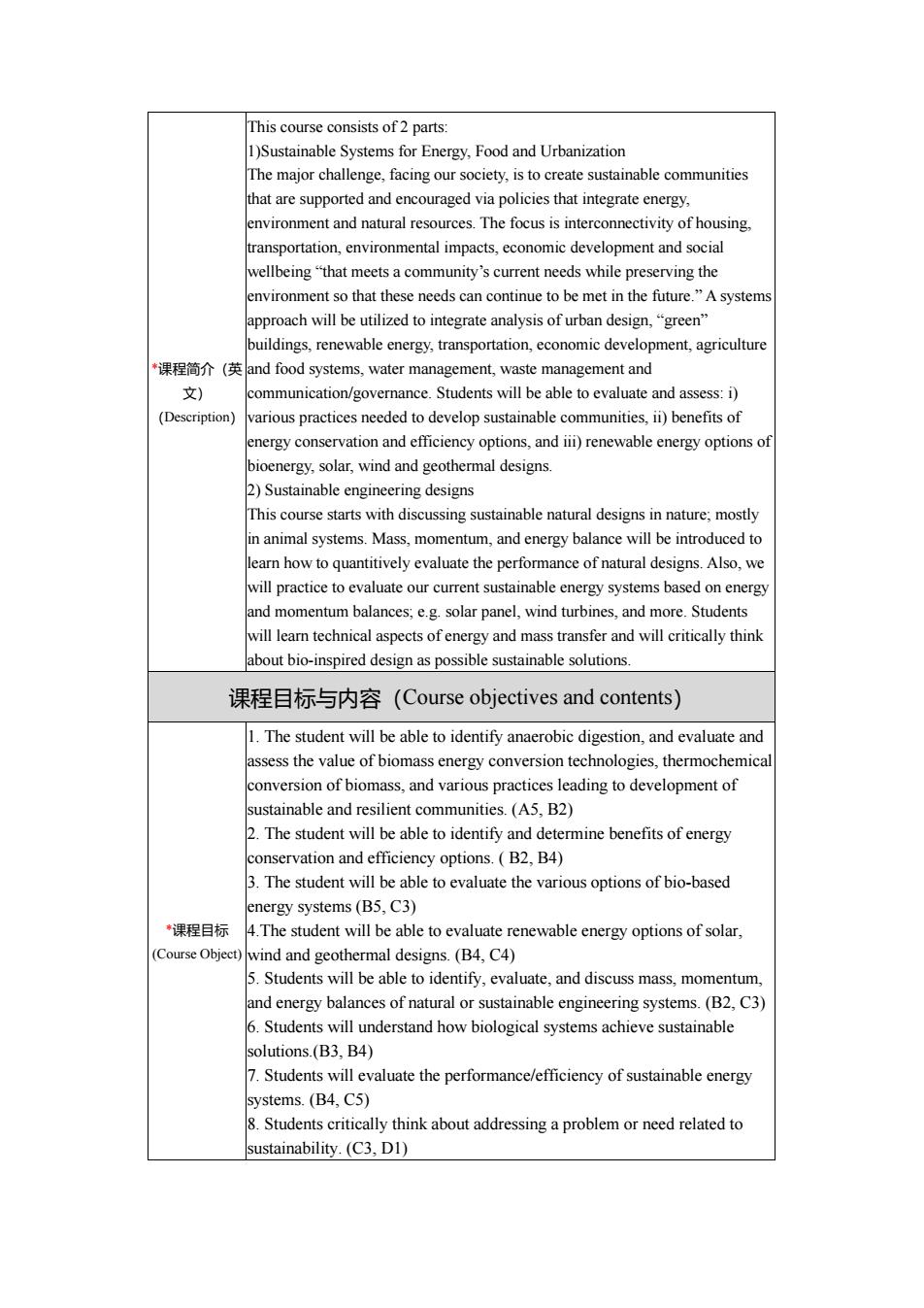正在加载图片...

This course consists of2 parts Sustainable Systen sfor Energy,Food and Urbanization The major challenge,facingour,is sustainable hat are supported and encouraged via policies that integrate energy. environment and natural resources.The focus is interconnectivity of housing. ransportation.environmental impacts.economic development and social ellbeing"that meets a community's eeds while environmen o that these needs can ”A system approach will be utilized to integrate analysis of urban design,green buildings,renewable energy.transportation,economic development,agriculture *课程简介(英and food systems,vater management,.waste management and ommunication/governance Students will be able to evaluate and assess:i) tion arious practices )benefits of energy conservation and efficiency options,and i)renewable energy optionso bioenergy,solar,wind and geothermal designs. 2)Sustainable engineering designs This course starts with discussing sustainable natural designs in nature,mostly animal systems.Mass,momentum,and energy balanc eintroduced to a how to quantitively evaluate the performance of natural designs.Also,w will practice to evaluate our current sustainable energy systems based on energ and momentum balances;e.g.solar panel,wind turbines,and more.Students will learn technical aspects of energy and mass transfer and will critically think about bio-inspired design as possble sustainable solutions. 课程目标与内容(Course objectives and contents) 1.The student will be able to identify anaerobic digestion.and evaluate and ss the value of bi energy conve ersior technologies,thermocl conversion of biomass,and various practices leading to development of sustainable and resilient communities.(A5.B2) 2.The student will be able to identify and determine benefits of energy conservation and efficiency options.(B2,B4) The student will be able to valuate the various options of bio-based energy systems (B5,C3) *课程目标 4.The student will be able to evaluate renewable energy options of solar. (Course Object)wind and geothermal designs.(B4.C4) 5.Students will be able to identify,evaluate,and discuss mass,momentum, and energy balances of natural or sustainable engineering systems.(B2.C3) 6.Students will understand how biological systems achie sustainable lutions.(B3.B4) 7.Students will evaluate the performance/efficiency of sustainable energy systems.(B4,C5) 8.Students critically think about addressing a problem or need related to sustainability.(C3,D1) *课程简介(英 文) (Description) This course consists of 2 parts: 1)Sustainable Systems for Energy, Food and Urbanization The major challenge, facing our society, is to create sustainable communities that are supported and encouraged via policies that integrate energy, environment and natural resources. The focus is interconnectivity of housing, transportation, environmental impacts, economic development and social wellbeing “that meets a community’s current needs while preserving the environment so that these needs can continue to be met in the future.” A systems approach will be utilized to integrate analysis of urban design, “green” buildings, renewable energy, transportation, economic development, agriculture and food systems, water management, waste management and communication/governance. Students will be able to evaluate and assess: i) various practices needed to develop sustainable communities, ii) benefits of energy conservation and efficiency options, and iii) renewable energy options of bioenergy, solar, wind and geothermal designs. 2) Sustainable engineering designs This course starts with discussing sustainable natural designs in nature; mostly in animal systems. Mass, momentum, and energy balance will be introduced to learn how to quantitively evaluate the performance of natural designs. Also, we will practice to evaluate our current sustainable energy systems based on energy and momentum balances; e.g. solar panel, wind turbines, and more. Students will learn technical aspects of energy and mass transfer and will critically think about bio-inspired design as possible sustainable solutions. 课程目标与内容(Course objectives and contents) *课程目标 (Course Object) 1. The student will be able to identify anaerobic digestion, and evaluate and assess the value of biomass energy conversion technologies, thermochemical conversion of biomass, and various practices leading to development of sustainable and resilient communities. (A5, B2) 2. The student will be able to identify and determine benefits of energy conservation and efficiency options. ( B2, B4) 3. The student will be able to evaluate the various options of bio-based energy systems (B5, C3) 4.The student will be able to evaluate renewable energy options of solar, wind and geothermal designs. (B4, C4) 5. Students will be able to identify, evaluate, and discuss mass, momentum, and energy balances of natural or sustainable engineering systems. (B2, C3) 6. Students will understand how biological systems achieve sustainable solutions.(B3, B4) 7. Students will evaluate the performance/efficiency of sustainable energy systems. (B4, C5) 8. Students critically think about addressing a problem or need related to sustainability. (C3, D1)